Capitals performance
Financial capital
We identify and monitor our impacts through monthly monitoring of planned x performed results, based on the Business and Management Plan (PNG) and the Business Performance and Goals Contract (CMDE). The periodic monitoring of the CMDE indicators throughout 2019 signals that we have achieved our main goals:

In 2019, we recorded a profit of R$ 3.49 billion, an increase of R$ 3.22 billion in relation to 2018 (R$ 265.9 million). This increase is mainly due to the provision for deferred income tax in the amount of R$ 2.07 billion and the deferred social contribution in the amount of R$ 475.0 million, in addition to increases in some revenue lines.
Our gross operating revenue of R$ 6,187.0 million showed a positive variation of 7% (R$ 5.78 billion in 2018), mainly due to the growth in revenues from the supply, operation and maintenance of plants (R$ 369.4 million); and short-term electricity (R$ 386.0 million). From 2015 to 2019, the Compound Annual Growth Rate (CAGR) was 6.7%.
The operating costs and expenses and the result of the electric power service and the operating margin make up the following charts. The operating cash generation, expressed by Ebitda, was R$ 1.48 billion in 2019, compared to the amount of R$ 720.1 million in 2018. The Ebitda margin (Ebitda/Net Operating Revenue ratio) was 28.8% in 2019 against 15.1% obtained in 2018 – an increase of 13.7 percentage points.
The financial result for the year was R$ 578.9 million, compared with a negative result of R$ 42.0 million recorded in 2018, representing a positive variation of R$ 620.9 million due mainly to the positive difference between the Financial Income and the Financial Expenditure of R$ 485.0 million.
As part of our strategic planning and following our Disposal Policy, we are proceeding with the transfer of domain or ownership of our movable and immovable assets currently not linked to the business, to third parties, permanently or temporarily and with or without charges, aiming to reduce our operating costs and increase our revenue. As a result, two immovable properties were sold in 2019, totaling R$ 1.5 million. In addition to the disposals of properties not necessary for our activities, we sell unserviceable movable assets annually – we held two auctions in the year, totaling R$ 2.1 million.
Also within the purpose of disposal and aiming to meet one of the main guidelines issued by the Board of Executive Officers, in accordance with our Divestiture Plan, we are gradually withdrawing, since January 1st, 2020, our participation in the management of Hospital Nair Alves de Souza, approximately 25% of the cost of the entity each quarter until 2021, when we no longer intend to be associated with it.
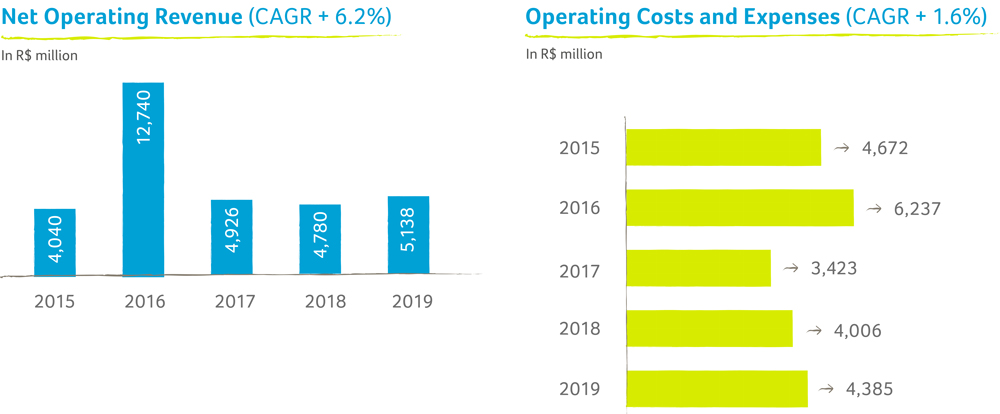

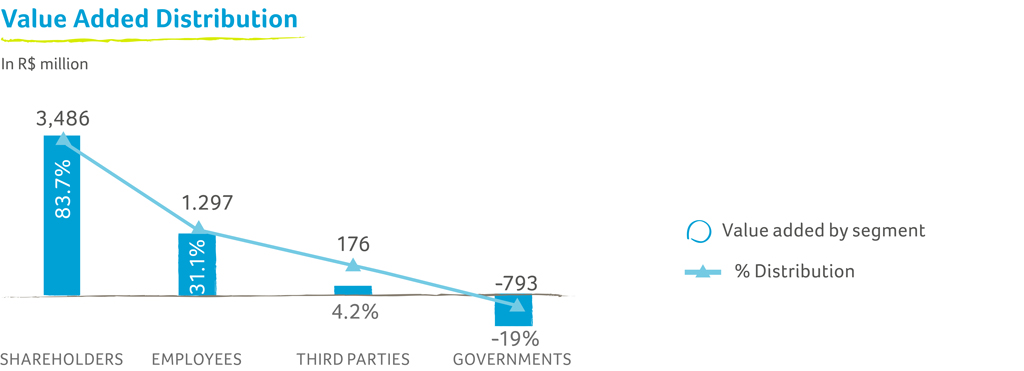
More information on Chesf’s economic-financial performance is available in the 2019 Management Report.
Manufacturad capital
Operational performance
The main reservoir in the Northeastern region, Sobradinho, decreased from 48.65% in April to 29.34% of its useful volume on December 31. This, however, did not affect Chesf’s operating performance indicators, which in some cases reached their best levels in recent years. We generated 20,734 GWh in 2019 compared to 15,132 GWh in 2018, an increase of 37%.
The availability of generating units, an indicator also evaluated by the Brazilian Electricity Regulatory Agency (Aneel) in the tariff adjustment processes, achieved their best result ever in 2019 (1.13). This result is due to the process initiated in 2016 to recover Chesf’s economic-financial balance. In 2017, improvements were observed, but the plants of the Paulo Afonso complex were still underperforming. However, in 2018, the indicator again showed positive results for all assets and in 2019 the target was met and exceeded. According to the readjustment process established by Aneel, when the company exceeds the target established in the generation concession contract, an additional revenue is applied. For this reason, there is an expectation of revenue incorporation in 2020.
Positive results were also registered in the Variable Portion (PV) and Availability of Transmission Lines Indicators, as we present in the graphics below.
12 remotely assisted facilities were incorporated to the Operation Centers and new supervision points were included for the Network Procedure 2.7, which deals with minimum requirements to be met by the agents regarding the information to be made available to the National System Operator. Additional investments were made in the area of automation, such as modernization of the operational measurement of the Itabaianinha Substation and replacement of 54 servers of the Open Energy Management System (Sage). These efforts resulted in increased monitoring of the system, reaching the mark of 248,641 supervision points.
Of the 25 projects in this situation, 22 were concluded in 2019, entering into the asset management of the Operations Board. We also continued the modernization plan, replacing end-of-life equipment to improve operating results, which brought more monitoring and automation resources and improved the safety and reliability of the system. As current regulation2 provides for increased revenues through the replacement of depreciated assets, the intention is to continue with the modernization plan in 2020. For those assets that cannot yet be replaced, we will maintain a differentiated maintenance plan.
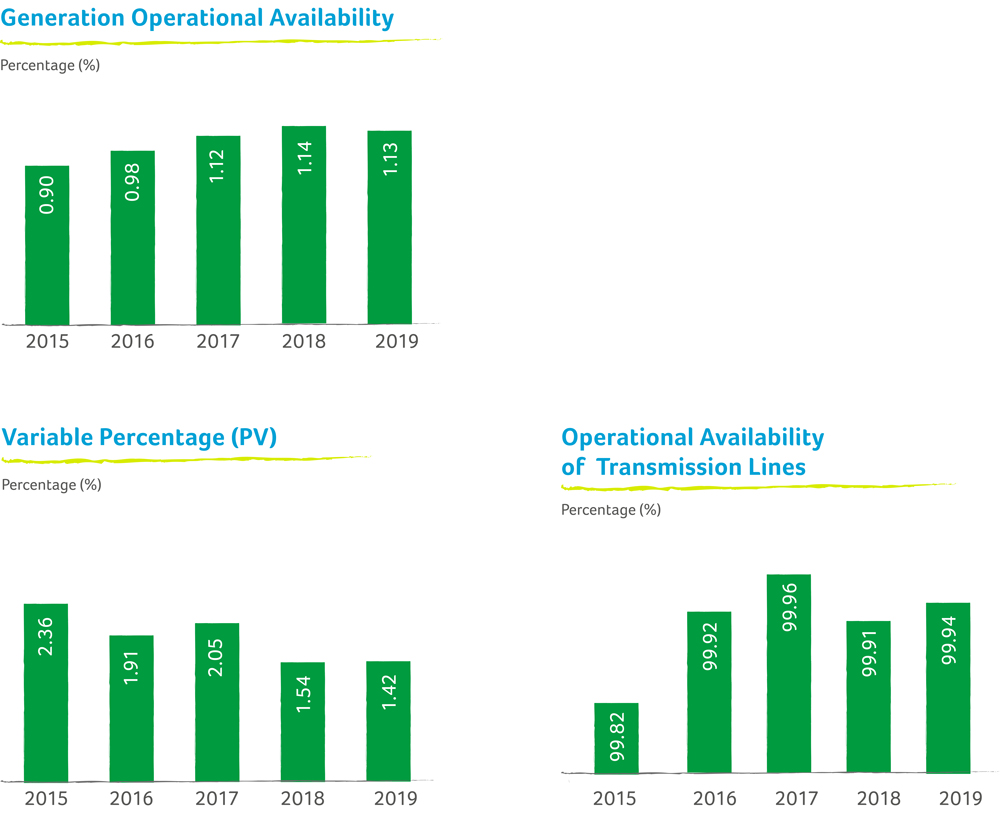
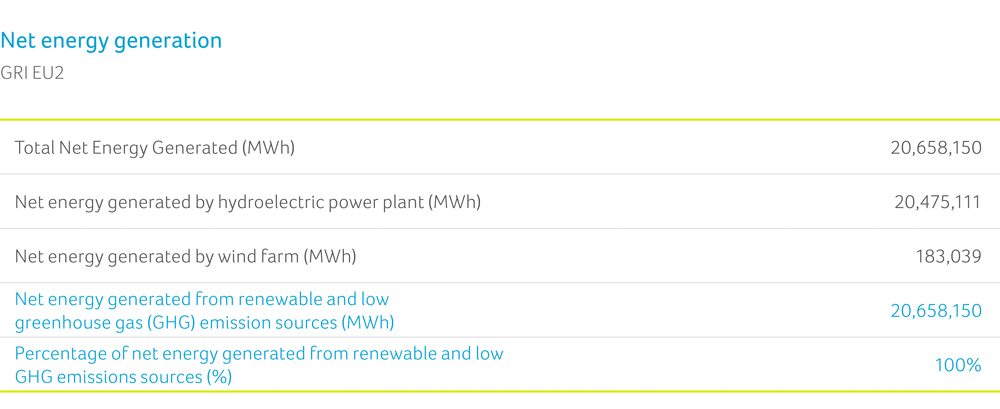
Energy supply management
In 2019, we executed a series of operational projects, among which we highlight the improvements in electromechanical systems of the plants and in civil structures and signaling of dams and plants; the modernization and improvement of protection systems and equipment, automation systems and equipment and telecommunications systems and equipment; the technical reserve of electromechanical equipment for plants; and the regulatory strategy of generation and transmission.
We also implemented firewall in 12 installations to meet the Cyber Security Program and expanded the operation and maintenance support systems in the areas of Automatic Voltage Regulation, Supervision of Protection Systems, Power Quality and Oscillography. Together with Inmetro, we maintained the accreditation of the Chesf Metrology Laboratory – MetroChesf, the implementation of pluviometry in six hydrological stations and the operationalization of hydrometric measurements in seven hydrological stations, in compliance with Resolution ANA/Aneel 03/2010.
Generation system
In 2019, we invested R$ 26.4 million in hydroelectric power plants under concession and on a quota basis to maintain operational levels of continuity and availability to meet demand.
- the basic project for implementing the digital systems and modernizing the generating units at the Sobradinho Hydroelectric Power Plant (HPP) was updated and sent to the responsible area to start the bidding process for the executive project and the execution of the works, whose contract was signed in April 2020;
- another basic project that continued was the implementation of the digital systems and modernization of the generating units of the Paulo Afonso IV HPP, which was sent to the contracting area in March 2020;
- the modernization services of the PA-IV HPP overhead cranes and of the Apolônio Sales HPP gantry cranes were concluded;
- several adaptation and maintenance services were also performed in the Generation System in operation, aiming at the elimination of technical, legal and environmental pending issues, as well as the replacement of equipment and components due to obsolescence or end of useful life;
- we received a proposal from one of the companies that participated in the final stage of the negotiation of the Public Call for the leasing of the assets and facilities of the Camaçari Thermal Power Plant. We then signed a 15-year lease agreement;
- after the diligence in the wind farm of Casa Nova I-A (27 MW) to raise the necessary costs for the conclusion and energization, we signed a contract with supplier to finalize the implementation and put it into operation, which should occur in June 2020;
- after the diligence in the wind farm of Casa Nova I-A (27 MW) to raise the necessary costs for the conclusion and energization, we signed a contract with supplier to finalize the implementation and put it into operation, which should occur in June 2020, with a contract expected to be signed in the first half of 2020;
- there were also significant advances in support actions and field activities aimed at finalizing the implementation of the 11 wind farms of the Special-Purpose Entities linked to the Pindaí wind complexes. Seven wind farms were delivered, and the others are expected to be completed in January 2020;
- we finalized the development of photovoltaic power station projects: Bom Nome Photovoltaic Power Plant (29.7 MWp) and Lapa Solar Photovoltaic Power Plant (100 MWp;
- we are installing solar panels in our substations in Northeastern states for our own power generation, replacing part of the supply from the distribution companies. In 2019, we started the implementation of 2.3 MWp in substations in Alagoas, Ceará, Paraíba, Piauí and Rio Grande do Norte, with completion expected in 2020;
- we continued with the studies for the development of three new wind projects which, according to the data already surveyed, total 748 MW of installed capacity, expected to be completed by 2023; and
- we are studying measurements in 17 solarimetric stations installed in the semiarid northeast, aiming to develop our own solar generation projects with photovoltaic or heliothermal technologies. These measurements will enable the development of six new projects that, according to the data collected so far, total 535 MWp of installed power, expected to be completed by 2023.
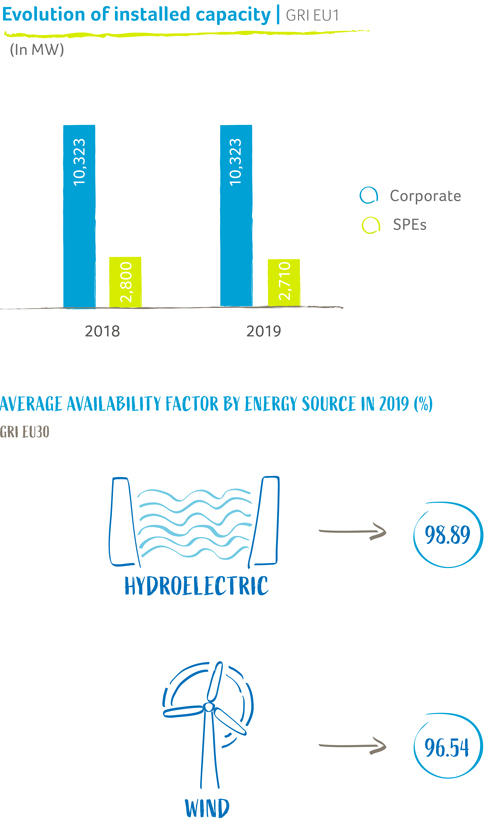
Energy efficiency program
Advances in 2019:
- ISO 50001: following the strategic actions within the Energy Management System, a new external audit was performed at the Messias Substation, which attested to compliance with the requirements established by the ISO 50001 standard;
- CONTA ZERO PROGRAM (PCZ): the basic projects were concluded, tendered and contracted, the orders for the beginning of the services were given and the works of four of the six projects that make up the portfolio of actions. The basic projects of the mentioned distributed generation plants were also concluded, and the bidding processes of the services related to the implementation were initiated;
- RESEARCH & DEVELOPMENT + INNOVATION – STORAGE A TMSI SUBSTATION: preliminary studies were completed and served as the basis for the Public R&D+I 02/2019 Call entitled “Photovoltaic Mini Generation with Battery Power Storage as an Autonomous Source of Supply for Substation Services”. The pioneering research aims to integrate with other projects developed in the Messias Substation and expand Chesf’s references in Energy Management and Energy Efficiency associated with Distributed Generation and the National System Operator (ONS) Network Procedures; and
- R&D+I – USE OF SOLAR ENERGY IN LAKES OF HYDROELECTRIC POWER PLANTS: the Sobradinho Photovoltaic Mini Generation was connected and entered into research operation, stage 1MW, whose scientific studies and monitoring will point out and quantify the main gains in energy efficiency with the complementation of the supply power of auxiliary services of the Sobradinho hydroelectric power plant.
Transmission system
In 2019, the great challenge of the Engineering and Construction Board in energy transmission was to put the projects in arrears into operation. We invested more than R$ 300 million in the transmission system, with 42 expansion and reinforcement projects in progress, resulting in the conclusion of 22 projects. We delivered 331 km of transmission lines, 4 new substations, 2 substations with new yards and 17 new transformers with reinforcements in the facilities, which represents an increase in transformation capacity of 2,644 MVA.
We also made progress on the remote assistance project. Thus, all the new substations went into operation already with the requirements to be managed remotely, from an operating center. This project contributes to the challenge of managing our 143 substations and more than 20,000 kilometers of transmission lines in an optimized, efficient and effective manner, in order to overcome the significant distances and access difficulties in the Chesf network.
Currently, 70% of our facilities are remotely assisted and the remaining 30% have local assistance due to their strategic importance, such as substations serving a capital city, or which are part of a strategic corridor. These units are managed remotely or through one of seven regional offices (Paulo Afonso, Sobradinho, Teresina, Fortaleza, Natal, Salvador and Recife). In 2020, we should improve remote assistance with the development of an autonomous substation re-establishment project.
The maintenance of transmission lines gained a new ally, the laser scan, equipment for georeferenced mapping that is assembled in a helicopter to scan the land.
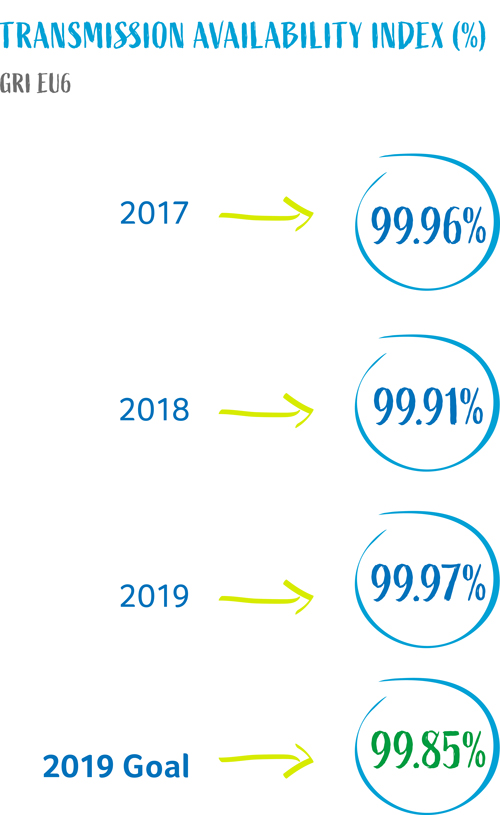
Special-Purpose Entities (SPEs)
We invested R$ 324.5 million in joint ventures during 2019, of which R$ 198.4 million were invested in SPEs for hydraulic generation and R$ 126.1 million in wind power generation.
The Belo Monte Hydroelectric Power Plant (HPP) went 100% operational, totaling 11,223.1 MW of installed capacity. Chesf’s equity participation in this venture is 15%. Sinop Hydroelectric Power Plant also went 100% operational in 2019, totaling 401.8 MW of installed capacity. Chesf’s share participation in this venture is 24.5%. In March 2019, we also concluded our divestment in the SPEs of the Sento Sé Complex.
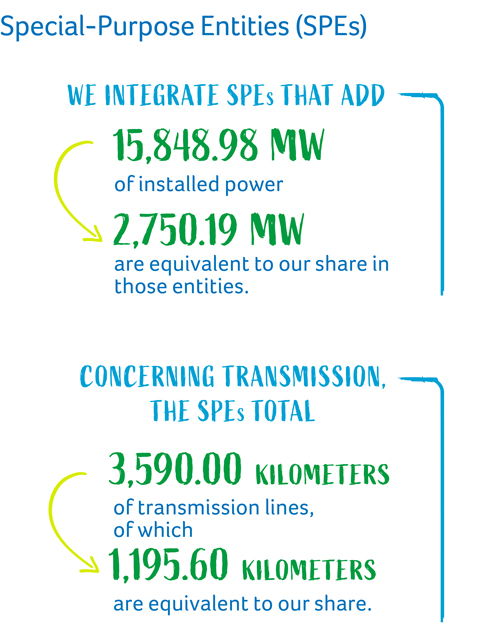
Intellectual capital
R&D and Innovation
Our main commitment is to comply with Law No. 9,991/2000, which determines the minimum investment of resources in research, development, and innovation projects of 1% of Net Operating Revenue (ROL). We reinforce this practice by inserting in the business planning and in the Chesf 2020-2035 Strategic Map a stage of development of research and innovation projects.
The main infrastructure and technological resources available are the Petrolina Solar Energy Reference Center (Cresp) and the Chesf Development and Innovation Center.
The year 2019 was one of many achievements. The main projects undertaken were:
- noise monitoring in hydroelectric power plant;
- non-destructive techniques (RAA – Alkali-Agregado Reaction);
- R&D from the idea to the market, responsible for the development of the Intelligent Innovation Management System (Sigi), which will be used for the management of our entire process of developing innovation projects within the Chesf Development and Innovation Center;
- solar energy in lakes of hydroelectric power plants;
- Petrolina solar platform (PE);
- new concept of wind turbine; and
- location study of large solar power plants.
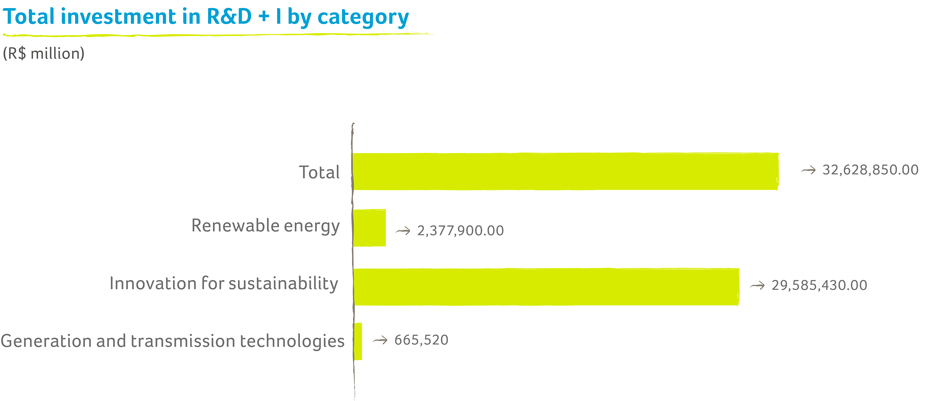
Energy transition
Brazil already has a predominantly clean generation, so improvement efforts should be directed to alternative sources, such as solar and wind power, still under development.
In the strategic management of our sources of energy generation and new projects, we see a way to add value to our business through the effective implementation of measures to reduce impacts, contributing to the fight against climate change and visualizing new business opportunities in the carbon market.
The year 2019 was one of many achievements in favor of the energy transition. We also highlight the maintenance of the ISO 50001 Certification in the Messias Substation, to establish Electricity Consumption Base Lines and Energy Performance Indicators (IDE), which help to monitor energy consumption, seeking reduction; and the implementation of the Floating Photovoltaic Mini Generation Project, in the reservoir of the Sobradinho Hydroelectric Power Plant, with initial installed capacity of 1 MWp and expected expansion to 2.5 MWp. This project, with features unprecedented in the country, is part of a Research & Development + Innovation initiative approved by Aneel entitled “Exploration of solar energy in lakes of hydroelectric power plants”.
Petrolina Solar Energy Reference Center
A complex where research on photovoltaic and heliothermic technology, integration of solar and wind sources, and energy storage are developed. In 2019, the 1 MWp floating photovoltaic plant was inaugurated, installed in the Sobradinho reservoir (2.5 MWp), whose operation is integrated to the HPP’s, meeting the demands of auxiliary services. The technical studies to evaluate the floating technology were initiated. As of 2020, the second stage of this project will be executed – unprecedented in the country – which will total 2.5MWp when fully completed. Thermosolar concentrating plants will also be installed at Cresp, one with the Central Tower technology, currently in the Public Call phase, and a thermosolar concentrating plant with a parabolic trough, whose Public Call should be published by June 2020.
Wind generation
In 2018, a Public Call was made for innovative projects that develop technologies and studies involving hybrid plants in several lines. As a result of this work, in 2019 Chesf started the process of contracting three R&D+I projects:
- development of a new concept of a low-cost wind turbine with 3 MW generation capacity (contracted project);
- optimization of Renewable Energy Systems with High-Performance Storage (project under contract); and
- hybrid system (wind and solar) with energy storage that will total installed capacity of more than 4 MW (project under contract).
Social and relationship capital
We communicate with our stakeholders constantly throughout the year through channels that can range from meetings, visits, telephone contacts and e-mails to communication newsletters, contact through the supplier service center and customer satisfaction surveys.
This dialogue is guided by Eletrobras Communication and Engagement Policy with Stakeholders, which provides speed, precision, commitment and transparency, among other principles.
The identification and selection of stakeholders is made in a careful manner, based on the guidelines of this same document and according to the mapping and prioritization by the strategic planning of Eletrobras companies.
Our stakeholders
- workforce/families;
- investors/shareholders/market analysts;
- communities;
- society;
- press / opinion makers;
- partners/sponsors/suppliers;
- governments/lawmakers/regulatory bodies;
- customers/consumers/distributors.
Natural capital
Chesf’s Environmental Management System is based on formal instruments, such as Eletrobras’ Environmental Policy, a set of guidelines and rules for environmentally responsible actions. There is also the Corporate Sustainability Management Indicator System (IGS System) – Environmental Module, of automated and online collection of indicators. It is expected, for 2020, that a consultant will be hired to improve the environmental management.
The control of the processes, in any of the departments, is performed through the Environmental Licensing System (Sislic). For the environmental regularization of the implementation of new ventures, we adopt indicators of time and management with the interested parties, and we establish countermeasures for the identified deviations.
Water
All Chesf’s hydroelectric projects are granted for the use of water resources in order to take advantage of hydroelectric potential. In the case of the São Francisco Hydrographic Basin Plants, the grants were requested within the deadline established in Joint ANA/Aneel Resolution 1,305/2015.
We monitor water quality and quantity conditions periodically in all basins where we have hydroelectric plants, obtaining data on storage, flow, nutrient concentration and biological parameters. In normal situations, water quality analyses follow a quarterly schedule. In cases of water crisis, this schedule may become fortnightly and, in some specific actions, daily. We also monitor our reservoirs, seeking compliance with legal environmental parameters, and we raise awareness among the populations around the basins through the Education and Social Communication Programs.
We had a commitment to reduce the water consumption of the supply network in administrative activities by 0.3% in 2019. To this end, we carried out periodic maintenance in the water supply facilities, leading us to comply with a 23.3% reduction. In addition, the maintenance made it possible to identify improvement points, such as the standardization of the process and the redefinition of the management team.
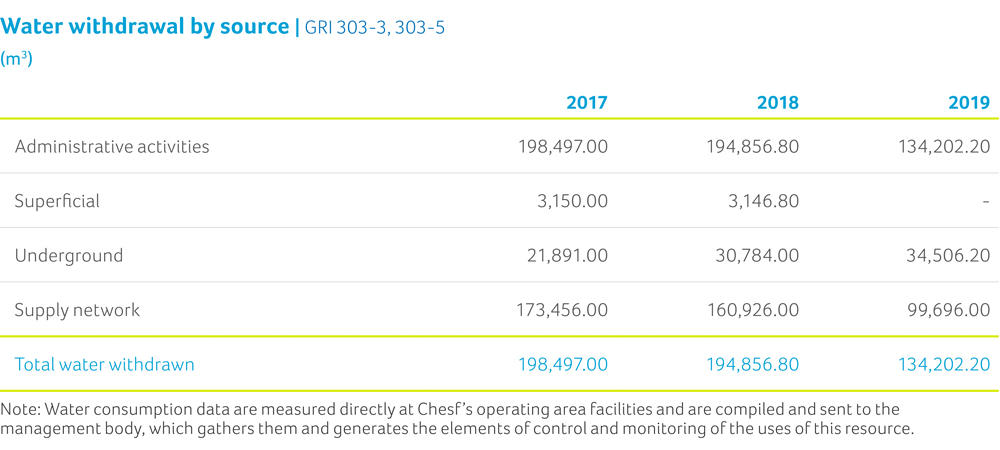
Climate change
Sustainable Development Goal 13 (Action Against Global Climate Change) has been identified by Eletrobras as one of the most relevant goals for all its companies. We manage our greenhouse gas (GHG) emissions with a focus on reduction and actively contribute to the transition of the Brazilian energy matrix to an increasingly clean and low carbon model.
Since 2009, we have published the result annually in the Greenhouse Gas Emissions Inventory of Eletrobras companies. The information is accounted for using the IPCC methodology (2006) and the GHG Protocol guidelines. In addition, the GHG Emissions Inventory subsidizes us to respond to a number of environmental reports demanded by the market, such as the Carbon Disclosure Project, ISE (B3) and the Dow Jones Sustainability Index. Based on this diagnosis, we have established strategies, plans and targets for the reduction and management of greenhouse gas emissions.
In 2019 there was a 7.3% reduction in Chesf’s total emissions compared to 2018.
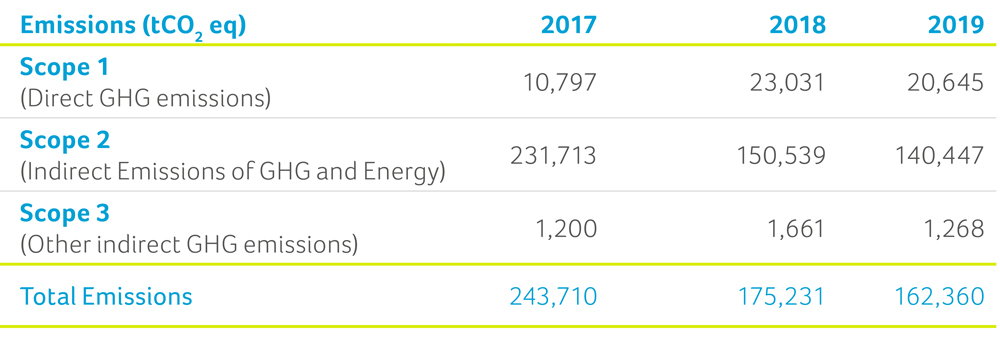
In 2019, Cepel developed the following computer programs to support member companies:
- Greenhouse Gas Emissions from Hydroelectric Reservoirs (Balcar): developed by Cepel with the objective of producing references in quantitative evaluation of Greenhouse Gases emissions in hydroelectric reservoirs; and
- Mudclima: also developed by Cepel in order to address three dimensions related to climate change: research for the use of climate information in the construction of flow scenarios for reservoirs; strategies and actions for social and environmental adaptation to climate change, one based on ecosystems and another in communities; and the development of adaptation strategies and actions aimed at the business of electricity companies.
Biodiversity
To avoid or minimize the impacts of transmission networks in Permanent Preservation Areas (PPAs), we have adopted the tower lifting procedure and carried out programs for fauna and flora rescue and selective replanting around the undertakings.
In 2019, three reforestation and recovery actions stood out:
- we reforested 2.5 hectares in the Caetés Ecological Station, located in the city of Paulista, part of the Metropolitan Region of Recife (PE), which occupies an area of approximately 157 hectares. We produced about one thousand seedlings of native species of the Atlantic Forest biome; planted 526 seedlings in degraded areas; maintained the forest nursery; installed and operated a compost plant; and donated seedlings to students of the Training Course for People’s Environmental Agents, developed in the Conservation Unit;
- we restored 15 hectares in the Saltinho Biological Reserve, located in the municipality of Tamandaré (PE), which occupies an area of approximately 562.57 hectares, with the Atlantic Forest Biome. The initiative is still under execution in areas comprised by the Saltinho Biological Reserve (Rebio) and the Legal Reserve of the Assentamento Laranjeiras Project, Rebio’s buffer zone. In 2019, we planted 27,573 seedlings in almost 32 hectares of non-continuous areas in these reserves; and
- we planted, maintained and monitored 400 Carnaúbas at Parque Estadual Botânico do Ceará, in Caucaia. We replaced 54 Carnaúbas from the 200 planted in 2018 and planted another 200 units in 2019, which are still being monitored, for eventual replacements.
In addition, Chesf ensures the operation of Xingó Forest Nursery, which in 2019 reached the production of 93,457 seedlings of native species of caatinga. One of the main actions of the nursery is the research aimed at the large-scale replantation of Melocactus zehntneri, a protected species considered to be in extinction. Throughout the year, 12,000 units were taken care of and maintained in the growing phase and a further 2,000 in germination. It takes, on average, three years to obtain a seedling with a diameter of ten centimeters. 76,473 seedlings were donated to several institutions for planting on the banks of rivers and streams in the Rio São Francisco basin. Another 157,856 units of seeds from the caatinga germplasm were also produced, destined to the recovery of the areas. Also, in 2019, 1,069 people from 11 schools, 3 universities and 3 projects visited the nursery.
Human capital
Employee profile, turn over and retention
In 2019, Chesf had a workforce of 3,193 employees, composed of 3,186 from its own staff and 7 requested from public administration bodies or companies. Of the total, there were 587 women and 2,606 men. In the same period, the turnover rate1 was 8.67%. There was one admission (by judicial determination) and 652 dismissals.
*1 Chesf calculates its turnover by using the following formula: [(hired+ dismissed/2)/average effective staff]x100.
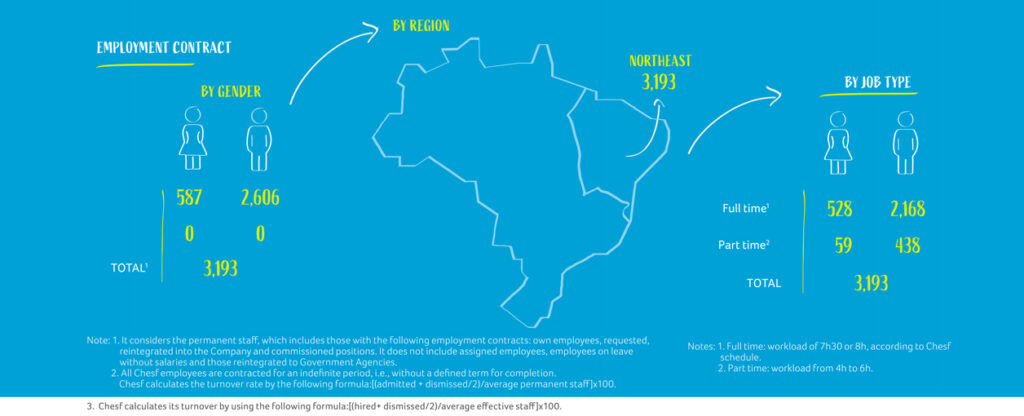
Consensual Employment Termination Agreement (PDC)
Two editions of the Consensual Employment Termination Agreement (PDC) were held in 2019, aimed at voluntary dismissal of eligible employees. In total, 626 were effectively dismissed by December. Expenses with PDC include financial incentives and a health plan for a maximum period of 36 months from the date of dismissal.


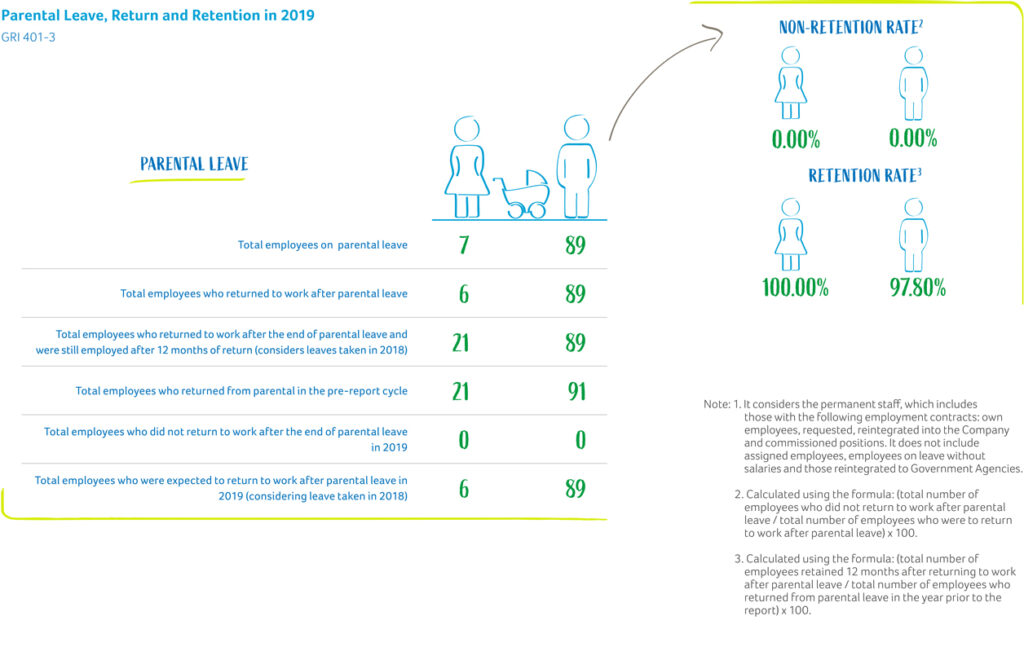
Diversity
As a mixed-capital company, we hire our employees through a competitive examination, as required by the Federal Constitution, and therefore we have no interference with the diversity profile of the staff. However, we reinforce that we do not tolerate prejudices of any nature and that we integrate everyone in the same way, regardless of gender identity, race, ethnicity, age, sexual orientation, social origin, physical or mental capacity.
We seek to promote an organizational culture of equal opportunities for all, a commitment that is expressed in our Code of Ethical Conduct and Integrity and Social Responsibility Policy. To maintain it, we implement actions to promote diversity through the Gender and Race Committees.
People and professional development management
Our way of managing has as its main objective to meet the guidelines of strategic planning, following a premise of excellence in people and organizational culture through the following strategies:
- performance promotion and continuous assessment, guiding career development, focusing on results and skills;
- development and implementation of model, networks and programs for employee development and knowledge management; and
- development of stimulating management methods capable of motivating and engaging people.
The bases for this action are in the Eletrobras Companies’ People Management Policy. The document contains principles and guidelines that are deployed in business strategy.
Our Corporate Education Plan (PEC) provides for training and capacity building that can contribute to the development of competencies related to the Company’s business guidelines, considering Strategic Planning as the main guideline. To this end, corporate education indicators are monitored every quarter, in accordance with the targets set by the PEC at the beginning of the year. Monthly meetings of the Educational Council are held, formed by a representative of each Board of Executive Officers and conducted by the Superintendence of People Management.
One of the highlights of the PEC is the Living and Learning (Vivendo e Aprendendo) Program, developed by Chesf to elevate the education of employees with a focus on Elementary and High School Courses. We carry out and coordinate the initiative in partnership with Sesi, and classes are held at our premises, during working hours.
We also invest in the participation of employees in graduate courses (lato sensu and stricto sensu) for the development of professional skills that are compatible with the activities performed – or that may be performed – and that are of interest to the organization. The long-term educational actions are all funded by Chesf, according to the PEC budget forecast. We also make available the benefit “Education Aid – Higher Education”, granted to all employees who do not have a college degree and do not have their employment contract suspended.
For the year of 2019, it is worth highlighting the offer to managers of a specific MBA for the electricity sector, developed by Fundação Getúlio Vargas (FGV). The objective was to align managers with different backgrounds and with the Company’s strategies. Training sessions on ethics were also held, among them:
- Code of Ethical Conduct and Integrity;
- Non-violent Communication;
- Tarde Rosa (Pink afternoon);
- Compliance Immersion Course;
- Ethical Intelligence – 2030 Agenda;
- Management and Determination of Public Ethics;
- Promotion of Respect for Diversity in the Work Environment.
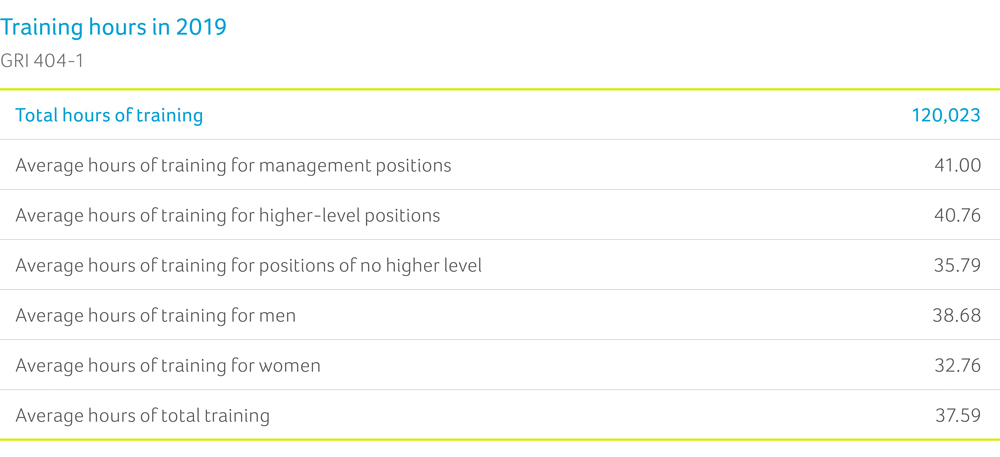
Occupational health and safety
Our actions and programs related to occupational health and safety are based on the promotion of quality of life and the prevention of occupational accidents and diseases. We also maintain measures to control hazards and risks that affect our activities.
We provide all employees with access to the Incident and Non-Conformity Recording System (CIN), an action of great relevance for the prevention of occupational accidents, occupational diseases and dismissals due to human error, since it allows everyone to become a true “health and safety agent”, recording incidents and deviations that may lead to the occurrence of damage to employees and to the electrical system operated by Chesf.
It is worth mentioning that Chesf has the Occupational Health and Safety Assessment Services (OHSAS 18.001:2007) certification, which has contributed to the management of the accident prevention system and strengthened the internal safety culture.
Chesf is divided into seven regional committees, in addition to the headquarters, and has decentralized Internal Committees for Accident for the Prevention of Accidents at Work (Cipas), according to what is defined in Regulatory Standard No. 5 (NR-05) of the Ministry of Economy. According to this NR, Cipas are parity commissions constituted by representatives elected by the employees and representatives appointed by the employer in equal number. The main attributions of the commissions are to identify process and work environment risks and elaborate the risk map; develop preventive actions for the solution of safety and health problems; participate in the implementation and quality control of the necessary prevention measures, as well as evaluate the priorities of action in the workplace; carry out periodic inspections and safety checks in working environments and conditions, seek situations of risk to the safety and health of workers; disseminate information regarding occupational safety and health; collaborate in the development and implementation of the Occupational Health Medical Control (PCMSO) and Environmental Risk Prevention (PPRA) Programs and other initiatives, among others. In Chesf, 100% of the employees are represented by Cipas, which totalizes, in the whole company, 21 committees.
There are also regulations to determine the mandatory occupational safety training (NR-10, NR-35, NR-18, among others) and the guidelines for the acquisition, use, safekeeping and conservation of Personal Protective Equipment (PPE) and Collective Protective Equipment (CPE). We make the same requirements of occupational health and safety management to the service providers.
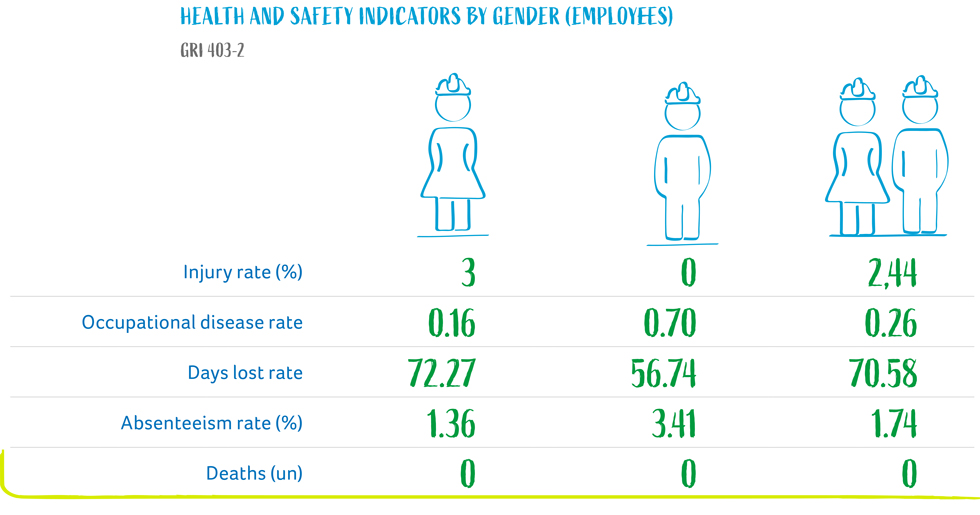
Occupational health and safety initiatives
Throughout 2019, Chesf’s Occupational Health and Safety (OHS) areas implemented and continued specific actions and programs for risk prevention and control, health promotion and quality of life and well-being.
- recertification of the Occupational Health and Safety (OHS) Management System in the international standard OHSAS 18.001:2007, concerning the activities at the Xingó Hydroelectric Power Plant (UXG), maintained for the eighth year in a row;
- installation of an innovative pilot system to reduce noise levels within the acceptable range of standards, at the Paulo Afonso IV Power Plant, with the completion of R&D, including knowledge and qualification training for Chesf professionals during the realization of the projects, which involved all of the Company’s offices;
- implementation of the EH&S (Environment, Health & Safety) module of SAP, with the objective of optimizing the interconnection of occupational health and safety processes, enabling better risk and information management and integration of OHS processes in all Eletrobras companies. For 2020, the launch of new transactions in the EH&S module is planned, which will bring better management of Personal Protective Equipment (PPE) supply, as well as in the treatment of information that will be made available to e-Social;
- completion of safety inspections, focusing on height protection equipment for substation and transmission line maintenance teams, as part of the PREVINA-SE Project, carried out at the Recife Regional Operation Department;
- assistance in the operation and development of the actions of the Internal Committees for Prevention of Accident at Work (Cipas), in the inspections, audits and monitoring of the documents of the Cipa Management System (SGC) and in the holding of the Internal Week for the Prevention of Accident at Work (Sipat);
- focus on the Project for the Prevention of Dismissals due to Human Error (DEH), besides the prevention of work accidents, in the training of professionals involved in the Headquarters and Regional offices, as well as in the corporate communication actions on the subject;
- labor safety audits in our own teams and those of contracted companies, and documentation analysis;
- conducting campaigns in the area of health and quality of life, such as White January, Prevention at Carnaval, Green April, Prevention at São João, Pink October, Blue November and the World AIDS Day;
- the second edition of the Art and Expression (Arte e Expressão) Project was held at the headquarters and in Paulo Afonso, Salvador and Sobradinho. The event included a discussion with Art and Mental Health professionals, and an exhibition of art and handicraft pieces produced by the employees, as well as theater presentations and workshops to improve emotional well-being and care for self-esteem. Talks and workshops on mental health at work, stress and anxiety prevention, emotional management and sleep hygiene were also held in Sobradinho, Teresina and Fortaleza. The Mental Health Events reached the participation of 150 employees throughout Chesf;
- celebration of five years of the Maternity Support Room, a quiet, comfortable and suitable place for the collection and storage of breast milk, ensuring ideal space for mothers to collect and store their breast milk. Since its inauguration, 25 employees have already made use of this resource during the period of return from maternity leave;
- continuity of the activities of the Health Promotion Center (CPS) in Recife and Sobradinho and the resumption of the operation of the Salvador CPS;
- Chesf’s participation in the Circuit Races in Recife and Salvador, in the Night Run and EcoRun Sunset races, in which the Company received the award for the largest participating team. Still in the fight against sedentarism, the regional of Fortaleza held the 2nd Healthy Circuit (Circuito Saudável) in the promotion of physical activities, with a race in the internal area of Chesf;
- Vaccination Campaign against influenza, serving 1,836 employees;
- the resumption of labor gymnastics for the headquarters public; and
- the Organic Trade Fair (Feira de Orgânicos) is held fortnightly at the headquarters for the fourth consecutive year.
Human rights
The principles and guidelines that guide human rights management can be found in Eletrobras’ Social Responsibility Policy, the Code of Ethical Conduct and Integrity, the Logistics Policy of Eletrobras companies’ supplies, in the Eletrobras Companies’ Sustainability Policy and in the Eletrobras Suppliers’ Guide of Conduct.
We monitor the implementation of Chesf’s Business Plan and Management actions – PNG 2019-2023, by using the following indicators:
- stimulating 100% of level 1 suppliers (critical) to adopt the practice of valuing and promoting diversity;
- dealing with 100% of human rights complaints by 2020; and
- obtaining a percentage of women occupying management positions at least equal to the percentage of women in the Company.
Additionally, we also monitor the Human Rights and Exercise of Citizenship Program, through PDNG 2020-2024, aiming to train 100% of our workforce and 100% of employees of outsourced companies in Human Rights and Diversity, in addition to influencing Relationship Publics on practices of Diversity and non-violation of Human Rights.
The impacts of diversity management and gender equality are identified and monitored through Chesf’s Pro-Gender and Race Equity Plan, 2018 – 2020 Edition, being a biannual instrument. We work with Eletrobras’ Human Rights Working Group (WG), which carries out actions to encourage suppliers to answer the due diligence questionnaire in order to identify possible human rights violations, improve the relationship structure with suppliers, and define actions aimed at this public. It is worth noting that this WG is still being implemented, as is the Chesf Human Rights and Exercise of Citizenship Program.
In 2019, several actions were taken to promote awareness regarding the implementation of Human Rights at Chesf, with special emphasis on the following:
- May 18th Campaign – Sexual Violence Against Children and Adolescents, in which we support the state initiative, producing posters for distribution by the Network in Pernambuco;
- The Lilac August Campaign, which has been defending the rights of women in violent situations;
- Campaign “16 days of Activism for the end of violence against Women”;
- Awareness Campaign in the Women’s Month (March) with the theme “Recognition and Empowerment of Women in the Workspace”;
- Popcorn & Knowledge (Pipoca & Conhecimento) event, with the showing of the movie “Big Eyes”, to promote reflection on women’s causes;
- Workshop on Human Rights and Diversity, with the objective of deepening the knowledge on the subject of the members of the Gender and Race Committee;
- Pink October Campaign;
- Blue November campaign;
- lectures and educational actions that addressed the issues of the Code of Ethical Conduct and Integrity;
- lecture on “Ethical Intelligence and Human Sustainability”, given by Professor Regina Migliori.
Indigenous peoples’ rights
The indigenous issue is discussed in the Environment Committee of Eletrobras companies, through a permanent working group created in 2019 from a commission existing since 2012. The Commission prepared the guidelines for relations with these peoples, which were included in version 4.0 of the Environmental Policy of Eletrobras companies.


